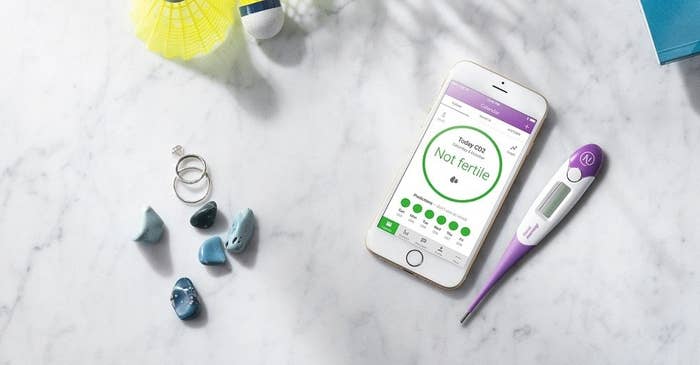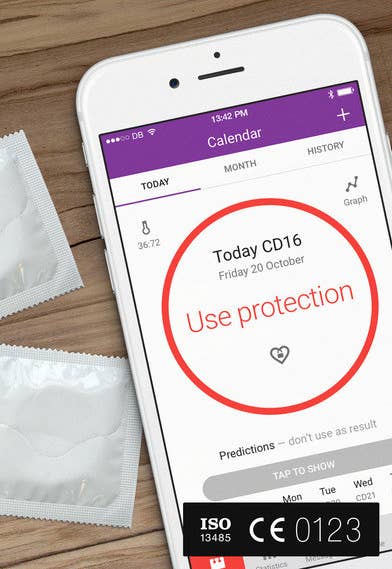
An app called Natural Cycles has become the first to be classified as a medical device for use as contraception.
Natural Cycles uses a woman's body temperature and menstrual cycle data to tell her when she is fertile. On fertile days, users must abstain from sex or use other protection such as condoms to prevent pregnancy. The app was approved as a class IIb medical device by Tüv Süd, a notified body in Sweden where it is based.
But sexual health organisations are warning that being classed as a medical device does not guarantee that the app will effectively prevent pregnancy. Sexual health charity the FPA, Fertility UK, and the Faculty of Sexual and Reproductive Health of the Royal College of Obstetricians and Gynaecologists are jointly calling for more large-scale independent trials to ensure that evidence for such apps is on a par with other rigorously tested methods of contraception.
Natural Cycles is one of numerous apps that help women practise a method of contraception called natural family planning, also known as the fertility awareness method.
Natural family planning involves monitoring your body for signs of ovulation, like an increase in your temperature, or a change in cervical mucus.
"The thing about the female egg is that it only lives for about 24 hours. So if you could reliably know when you've ovulated as a woman, and then you give that egg two or three days to die, any time after that in the cycle you will not get pregnant because there's no egg to fertilise," Dr Susan Walker, a senior lecturer in sexual health at Anglia Ruskin University, told BuzzFeed News.
Taking your temperature is what sets Natural Cycles and other apps like it apart from standard period-tracking apps. Without temperature information an app can can guess at your ovulation day based on your average cycle length, but can't be sure when you actually have ovulated, and so you can't use it as a reliable form of birth control.
You don't actually need an app to practise natural family planning – although it does cut down on paperwork. Even so, the FPA advises that natural family planning is most effective if you’re taught how to do it by a specialist teacher, and you monitor all three fertility indicators – temperature, menstrual cycle length, and cervical secretions.
But natural family planning is not for everyone. For starters, it can only protect against pregnancy, not STIs.
And if you're considering ditching the Pill because remembering to take it each day is too much effort, you probably won't like having to remember to take your temperature every morning.
"You really have to commit to it, whether you're doing it the traditional way or you're using an app. You have to take your temperature every morning and record that, because without all that data it's not really any use to you," Bekki Burbidge, head of communications at the FPA, told BuzzFeed News. "It's not a method that's going to suit everybody."
But for women like Natural Cycles co-founder Dr Elina Berglund, who want an alternative to hormonal contraception, it's an option worth pursuing. Along with her husband and co-founder Dr Raoul Scherwitzl, Berglund created the algorithm used in the app for personal use, before deciding it was something she should share with the rest of the world.
"When it comes to contraception it's all about choice. It's not like one solution will fit all women," said Berglund.
"Our typical user is in a stable relationship a few years before wanting to have kids. At first she starts to use the app to prevent pregnancy, and when she's ready [to get pregnant] she switches to plan, and usually she gets pregnant quite quickly, because the app already knows her body and cycle."
To use the app, you need a monthly or yearly subscription, and a thermometer that you have to use to take your temperature each morning before you get out of bed.
The app then tells you if you're likely to be fertile or not that day. And if the app gives you a "red day" – meaning you could be fertile – you have to abstain from sex, or use another method of protection such as condoms.

Berglund says typically women will start with 40% "green days" – days on which it's safe to have sex – on the app, and that this number will go up as it learns more about them. "The algorithm analyses women's body temperature and menstrual data and learns more and more from previous temperatures and previous cycles to know the unique woman," she said.
Natural Cycles published a paper last year in the European Journal of Contraception and Reproductive Healthcare looking at how effective the app was at preventing pregnancy. The study involved over 4,000 users of the app.
When it comes to contraceptive effectiveness you'll usually get two numbers: rating how effective it is with "perfect" use, and how effective it is with “typical” use.
Perfect use is using the method exactly as instructed, every time, without fail. Typical use is closer to what the average person's experience might be – for example, with the Pill, typical use will include people who occasionally forget to take it.
Natural Cycles' own analysis shows that with perfect use just 0.5 out of 100 people will get pregnant in a year using the app as contraception, with this number rising to 7 in 100 for typical use.
When used perfectly the combined oral contraceptive pill (aka the Pill) results in about 0.3 pregnancies per 100 women per year. With typical use, that number rises to almost 9 per 100.
But the study has some drawbacks – for one, it was done by the team behind the app themselves, so isn't independent, and the data was analysed retrospectively. According to NHS Choices: "The retrospective design means data was not collected to specifically answer this question and may not be fit for purpose."
And most women included were aged between 20 and 35, so there's no evidence the results would apply to women outside that range.
"They certainly had lots of women in this study, but what they will need to do is follow women up for a longer period of time, because things change," Walker said.
Berglund told BuzzFeed News that the Natural Cycles team analyse the data they have internally every month. She said they're also in the process of publishing an updated version of last year's study, this time with around 12,000 women included, in a peer-reviewed journal: "I can't say too much about the numbers, but it's going in the right direction."
Diana Mansour, vice president for clinical quality at the Faculty for Sexual and Reproductive Healthcare, said in a statement: “There are hundreds of apps which claim to help users plan or prevent a pregnancy – these come in all manner of forms and some will be more effective than others. Without independent evaluation we can’t say for certain which will be effective at achieving this.
“Women who wish to use fertility awareness-based contraception are advised to receive guidance from a qualified teacher to learn how to effectively monitor the different indicators. Apps currently do not come with this teaching, leaving room for misunderstanding and inaccurate use."
